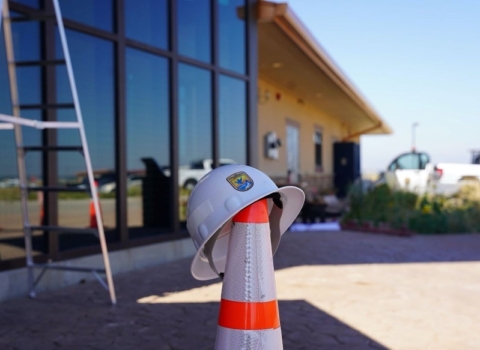Those who work for the National Wildlife Refuge System are caretakers of America’s nature – the wild places and species that have defined our nation since its inception. Bill Barrett was one of those caretakers. For six years he helped protect and conserve the special places and wildlife of Conboy National Wildlife Refuge near Glenwood in Central Washington. Barrett passed away this fall and the impact he made at the refuge and those he worked with will always be remembered.
“Bill really enjoyed his job, and his dedication showed through on a daily basis. Although Bill completed many important habitat projects in the field, his legacy with us is just as much about who he was as a person,” said refuge manager Trevor Sheffels. “I will always remember Bill as a kind-hearted man, a hard worker, and someone who was first to step in without complaint when someone else needed a hand.”
Depending on the day, Barrett could be found using his expertise to help wildlife in many ways: mowing wetlands to open habitat for migrating waterfowl and the endangered Oregon spotted frog; using an excavator to clean plant-choked ditches; and removing encroaching pine from greater sandhill crane breeding areas. It takes a team of people to care for a national wildlife refuge national wildlife refuge
A national wildlife refuge is typically a contiguous area of land and water managed by the U.S. Fish and Wildlife Service for the conservation and, where appropriate, restoration of fish, wildlife and plant resources and their habitats for the benefit of present and future generations of Americans.
Learn more about national wildlife refuge – a refuge manager, biologists, park rangers and maintenance workers. Barrett was the maintenance worker and heavy equipment operator at Conboy Lake.
Maintenance professionals are essential members of the refuge management team, largely responsible for actions that shape the habitat and available wildlife experiences on the refuge. From operating heavy equipment, to removing invasive plants, to managing the water structures, maintenance and heavy equipment operations professionals use their skills to meet the wildlife and habitat goals for the refuge.
Each refuge develops a strategic management plan and goals for the refuge. Maintenance professionals work with refuge managers and biologists, implementing the on the ground actions for wildlife and habitat needed to accomplish the refuge’s goals. At Conboy Lake, the maintenance professional position is responsible for facilities, vehicle and equipment maintenance, and operating heavy equipment. They keep the vehicle fleet running and perform preventative maintenance on all of the refuge’s infrastructure, including installing water management structures.
A haven for rare plants, the oak, pine and aspen forests, wetlands, grassy prairies and streams of the refuge also support a rich and diverse community of wildlife. The refuge provides a safe home for thriving populations of migrating waterfowl, songbirds, elk, and rare species like the Oregon spotted frog and only breeding population of greater Sandhill cranes in Washington.
“Bill was absolutely crucial in helping the refuge to meet its mission,” said Sheffels. He was responsible for implementing many of the annual work plan activities like prepping fire lines for prescribed fire. At Conboy Lake, water plays a critical role in making sure wildlife have the habitat and food they need. Barrett maintained water control structures so that water could be efficiently delivered and retained in priority wetland management units.
“Bill was the person behind the scenes who made sure everyone else could do their jobs. When windstorms knocked down trees over access roads, Bill was quickly on-site to get the road opened back up,” said Sheffels. “When an overnight snow storm hit, he was out at first light the next morning plowing the entry road to make sure staff and visitors could get into the Refuge.”
The passion and dedication of Service employees makes a difference for wildlife. It also makes a difference for those they work with and the communities they serve.
Bill Barrett will be greatly missed by his colleagues.




